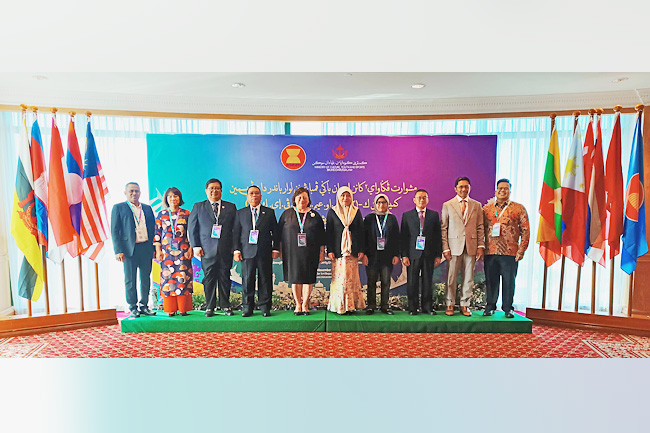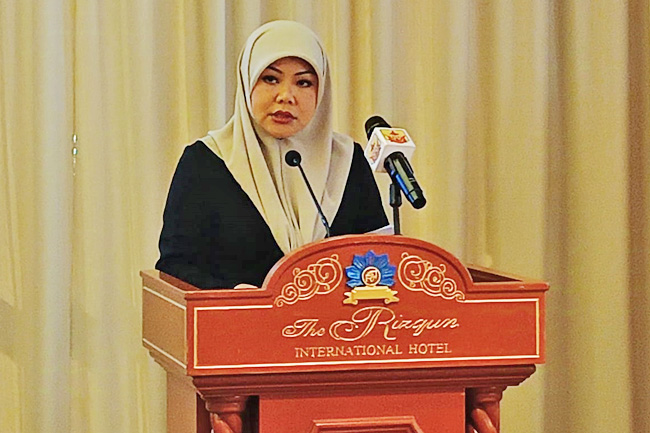The critical role of youth as change-makers must be acknowledged, as they are not merely leaders of tomorrow but the leaders of today, Permanent Secretary (Community) at the Ministry of Culture, Youth and Sports (MCYS) Hajah Nor Ashikin binti Haji Johari said.
Across ASEAN, young people are already at the forefront of rural development and poverty alleviation, contributing as entrepreneurs, volunteers, advocates and innovators, she said in her welcoming remarks as the Co-Chair of the 13th ASEAN Public Private People (PPP) Partnership Forum on Rural Development and Poverty Eradication (RDPE) yesterday.
ASEAN is home to a rich diversity of over 650 million people, nearly half of whom live in rural areas where access to vital resources such as healthcare, education, markets, and social services remains a pressing challenge. These rural communities, heavily reliant on agriculture, are among the most vulnerable to economic fluctuations, climate change, and social instability. Therefore, the discussions and initiatives that emerge from this forum are crucial in shaping a future where these rural communities are empowered, resilient, and thriving, she said.
“Our youth represent ASEAN’s greatest hope for a sustainable future. They bring innovation, adaptability and a passion for driving positive change – qualities essential for addressing poverty, inequality, and environmental concerns,” Hajah Nor Ashikin said.
Today’s youth, she added, have the potential to lead transformative changes in rural communities, making them more resilient to climate change and fostering sustainable livelihoods for generations.


“It is their energy, creativity, and determination that drive new solutions to long-standing challenges, making their engagement not only beneficial but essential. “We are also pleased to celebrate ASEAN’s progress in integrating youth into its development frameworks. Initiatives such as the ASEAN Master Plan on Rural Development and the ASEAN Village Network have made strides in empowering youth and strengthening rural communities.”
However, much more remains to be done, said Hajah Nor Ashikin, adding that the forum presents a critical opportunity for everyone to come together, share insights, and identify practical, impactful solutions that will empower youth and advance rural development.
The sessions were ‘The Role of Young Entrepreneurs in Social and Economic Change’; ‘Youth Engagement and Volunteerism in Addressing Poverty’; ‘Tackling Poverty Through Digitalisation’; ‘Youth and Equitable Access to Education and Life-Skills Programmes’; and ‘Rural Revitalisation for Poverty Reduction’. Hajah Nor Ashikin also welcomed past awardees of the ASEAN RDPE Leadership Awards. ”Their exceptional contributions to their communities serve as an inspiration to all, and the forum looks forward to learning from their experiences and continuing the dialogue on creating sustainable, inclusive communities across ASEAN.“
Moving forward, she encouraged everyone to engage actively in the discussions, share their expertise, and foster collaborations.
“I also call on participants to use this opportunity to build stronger networks, inspire tangible action, and develop strategies that we can bring back to our respective communities,” she said, expressing confidence that the forum will be filled with fruitful exchanges and collaborative efforts that will help shape a resilient, inclusive ASEAN for generations to come.
The forum yesterday kicked off the 21st ASEAN Senior Officials Meeting on Rural Development and Poverty Eradication (SOMRDPE) and Related Meetings, hosted by Brunei Darussalam through the MCYS. Co-chaired by Hajah Nor Ashikin and Permanent Secretary (Municipality and Districts) at the Ministry of Home Affairs Abdul Walid bin Haji Matassan, the forum is held under the theme ‘Youths as Agents of Change Towards a Resilient ASEAN: Strengthening the Role of Youths in Poverty Eradication and Rural Development’.
A total of 100 delegates are attending the 21st ASEAN SOMRDPE meeting and related meetings from ASEAN member countries and the Plus Three countries. Yesterday’s forum ended with closing remarks by the Co-Chair, Abdul Walid, who highlighted that one of the ministry’s most important tasks moving forward is to ensure the provision of necessary support to help young change-makers. He emphasised the importance of encouraging the active participation of youth in rural development, poverty eradication, and decision-making processes across all sectors. – Lyna Mohamad




